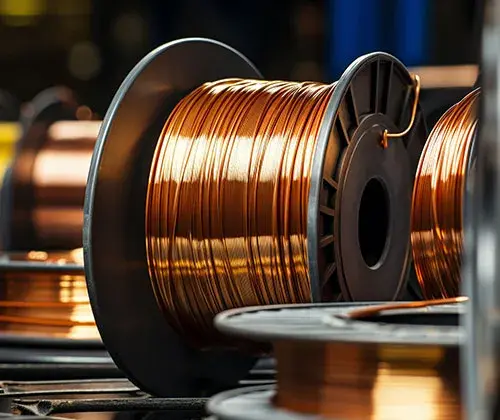
Enamelled Round Copper Winding Wire of Thermal Class 200ºC with Grade- 2 Dual Coating
- Grade 1 – thinnest insulation (single coating)
- Grade 2 – medium insulation (double coating)
- Grade 3 – thickest insulation (triple coating)
- 155-180°C – polyurethane (good solderability at 370-390°C)
- 180-200°C – polyesterimide (good thermal and chemical resistance, solderable above 470°C)
- 220°C – polyamidimide (good thermal and mechanical resistance, not solderable through enamel)
- 240°C – aromatic polyimide (very good thermal, chemical and radiation resistance, not solderable through enamel)
Recently, a batch of enameled wire was exported to Germany. This batch of enamelled round copper winding wire of thermal Class 200ºC with Grade- 2 dual coating meets the standard, is of high quality, has been rigorously tested and is in good condition. Customers are very satisfied with our products.
Enamel wire is typically made in three “grades”, with the number related to the thickness of enamel (sometimes assumed to be the number of coating layers, but in reality there can be more layers):
Grade 3 of enamelled wire should not be confused with triple-insulated wire.

For example, a comparison of the dimensions for 0.5 mm enamelled wire is as shown in the table below. The higher grades have significantly increased voltage breakdown at the expense of thicker insulation and outer diameter of the wire (so fewer wires can fit into the same cross-section area of the winding).
| Manufacturer data for 0.5 mm nominal diameter enamelled wire (circular cross-section) | |||||
|---|---|---|---|---|---|
| Grade | Min. diameter (mm) | Max. diameter (mm) | Elongation (%) | Breakdown voltage (V) | Tension (cN) |
| Grade 1 | 0.524 | 0.544 | 28 | 2400 | 1287 |
| Grade 2 | 0.545 | 0.566 | 28 | 4600 | 1287 |
| Grade 3 | 0.567 | 0.587 | 28 | 7000 | 1287 |
Apart from electrical insulation, the enamel also provides protection against corrosion or oxidation of the copper wire.
Typical electric strength of the enamel is around 170-220 V/μm, which is why a relatively thin layer of enamel can withstand significant voltage. For example, the 0.375 mm wire with the cracked enamel shown above has a voltage breakdown of 4.35 kV despite the enamel thickness being only 0.0275 mm.
The life span of electrical insulation is related to the temperature at which it is used. A typical minimum lifetime of enamel in its nominal temperature is at the order of 20 000 hours.
There are several nominal temperature ranges (thermal classes), listed with the basis on which the enamel is made, for example:
